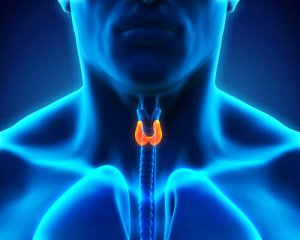What Happens In Your Body When You Have Thyroid Problems

A subtle increase or decrease in thyroid hormones can completely change people’s behavior. These can greatly affect our priorities, sexual behavior, appetite and attitude. The relationship between the thyroid and our mood is, therefore, a very close one.
Similar in size to an acorn and shaped like a butterfly, the thyroid gland is one of the most important parts of the human body. And so, if we begin to suffer thyroid problems, it is very likely to result in physical and emotional disorders.
Read on and find out more about the close relationship between our thyroid and our mood.
Functions and dysfunctions of the thyroid
The thyroid is the gland in charge of regulating our metabolism. It also provides our body with the energy it needs to perform its basic functions.
To put it simply, its job is to decide how fast our cells burn calories and how fast our heart beats. It’s located at the front of the neck just below the larynx and secretes three types of hormones.
One of these is calcitocin, which regulates the level of calcium in the blood. It can treat diseases such as osteoporosis, due to its ability to deposit this mineral in the bones.
The other two are thyroxine (T4) and triodothyronine (T3), which accelerate cell metabolism, increasing body heat. T4 is the main form of thyroid hormone in the blood. T3 influences the growth and development of the nervous system and stabilizes the heart rate.

The two most common thyroid problems are:
- Hypothyroidism (slow thyroid): this is when the gland is not active and produces an insufficient amount of hormones.
- Hyperthyroidism (overactive thyroid): here the gland is too active and produces an excessive amount of hormones.
Although both of these conditions come from a change in the normal functioning of this gland, the two conditions have very different effects, both physically and psychologically.
Physical symptoms of thyroid disorders
Physical symptoms will differ depending on which of these conditions we are talking about. They can even be totally opposite. However, what they both have in common is that there is an inadequate stimulation of different organs of the body.
Physical symptoms of hypothyroidism
- weight gain
- inability to tolerate cold environments
- irregular menstrual periods
- lower heart rate
- fatigue
- constipation
- dry skin
- hair loss and cracked nails
- muscle cramps
Physical symptoms of hypothyroidism
- absent-mindedness
- weight loss
- heat intolerance
- higher or irregular heart rate
- goiter
- fatigue or muscle weakness
- diarrhea, nausea and vomiting
- difficulty falling asleep
- trembling hands
What do thyroid problems look like in your mood?
As we’ve already pointed out, the relationship between our thyroid and our emotional state is a very close one. Variations in hormone levels directly affect not only the physical, but also the cognitive and emotional.
For this reason, the psychological symptoms and how they change our mood are equally important.
In fact, psychological disorders are the main reason why patients with hypothyroidism see a psychologist. They often complain of a progressive loss of initiative and interest due to a generalized slowing down of mental processes.
This causes them to suffer from memory problems, intellectual deterioration, and attention and concentration difficulties (especially in tasks involving calculations). There is also great confusion in their thoughts. The thyroid is very sensitive to psychological stimuli.
Therefore, the emotions of patients with low thyroid activity are full of sadness, nostalgia, melancholy and even depression.
Worst case scenario, when people haven’t been treated properly, the disorder can lead to dementia.
On the other hand, hyperthyroidism usually produces irritability, nervousness, hyperactivity, impatience and sudden mood swings. It’s associated with an increase in anxiety, mental agitation, emotional lability (they are prone to crying and can’t control it) and insomnia.
If these symptoms aren’t treated, delusions and hallucinations may appear, as well as very serious cardiac, bone, muscular and reproductive problems.

Depression and your thyroids
Interestingly, both hyperthyroidism and hypothyroidism have one thing in common: clear depressive symptoms.
We must be careful not to confuse depression with a thyroid problem, as many are prone to do. Although there may be apparent signs of depression, it does not mean that it exists per se.
In the case of hypothyroidism, signs of clinical depression are more noticeable. That’s because, as the production of hormones and the body’s metabolism decreases, the levels of serotonin, norepinephrine, and gamma-aminobutyric acid (GABA) in the brain also decrease.
We’ve already seen that oscillations and changes in thyroid function can go hand-in-hand with serious psychological disturbances. Therefore, we must be careful not to make a wrong diagnosis. Before starting treatment for depression, check your thyroid activity.
Your thyroids and mood are intimately linked
It’s easy to see physical and emotional instability when our thyroid hormone levels go up and down. When thyroid dysfunctions are treated correctly, certain psychological or psychiatric disorders often improve and may even disappear.
The relationship between the thyroids and mood is an increasingly evident scientific fact. Hence the importance of prevention and early diagnosis.
There are many signs and symptoms that tell us that something in our body is not functioning correctly. Some of these symptoms include radical changes in levels of fatigue when doing the same things, stark irritability, or problems falling asleep.
Thus, our recommendation is that at the slightest suspicion, see a specialist. Remember that a simple blood test can tell how your thyroid is working.
All cited sources were thoroughly reviewed by our team to ensure their quality, reliability, currency, and validity. The bibliography of this article was considered reliable and of academic or scientific accuracy.
- Bauer, M., Goetz, T., Glenn, T., y Whybrow, PC (2008). La interacción tiroides-cerebro en trastornos de la tiroides y trastornos del estado de ánimo. Revista de Neuroendocrinología. https://doi.org/10.1111/j.1365-2826.2008.01774.x
- Bauer, M., Heinz, A., y Whybrow, PC (2002). Hormonas tiroideas, serotonina y estado de ánimo: sinergia y significado en el cerebro adulto. Psiquiatría Molecular. https://doi.org/10.1038/sj.mp.4000963
This text is provided for informational purposes only and does not replace consultation with a professional. If in doubt, consult your specialist.








